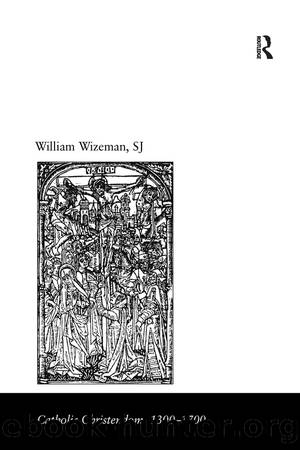The Theology and Spirituality of Mary Tudor's Church by William Wizeman

Author:William Wizeman [Wizeman, William]
Language: eng
Format: epub
Tags: History, General
ISBN: 9781351881302
Google: SmdQDwAAQBAJ
Publisher: Routledge
Published: 2017-09-29T03:39:21+00:00
Charity within the church
The active and communal aspects of Christianity were iterated by Marian theologians in their focus on the quality of charity in the church. Bonnerâs 1547 homily on Christian charity reappeared in the Marian collection, followed by Harpsfieldâs new sermon on the evil of breaking it. In the latter, Harpsfield insisted that Christ demanded perfect charity, and Christians could strive to fulfil Christâs command through the gift of grace.202 It was of this striving to be charitable that the Christianâs vocation consisted. According to Hogardeâs Mirrour of loue, charity was the only form of love acceptable to God, and could only be found within Christâs church. He warned Protestants that âSanctam ecclesiam while we do dispise, / Catholicam charitie shall neuer ariseâ.203 Belief in the âdoctryne Apostolikeâ must be coupled with âan hartye love to Godâ including charitable deeds; together they comprised âthe works of ryght beleifâ.204 Thus, the Profitable doctryne and the Honest instruction for children listed the Ten Commandments, the seven virtues, the Beatitudes and the seven deadly sins to instil comprehension of the requirements of charity, and the latter work presented Christâs two-fold commandment and the corporal and spiritual works of mercy as well. The former presented the Commandments as two tables, the first delineating those obligations to God, the second containing âall those thynges whych wee owe vnto oure neyghboureâ. Bonner, like Harpsfield, stated that the Commandments must be fulfilled completely, for love of God remained inextricably bound with love of neighbour. He compared the Decalogue to a musical instrument; if one string was out of tune, it could not produce true music. And although God had expressed most of the Commandments as negative imperatives, these implied that God wished his people to realize the converse, which were also explained in detail. Carranza discussed the Decalogue using the same approach.205
Marian writers also encouraged charitable giving and service, and their call to aid the poor was no doubt partly due to the rampant famine and disease of Maryâs reign.206 âPoor relief was therefore both a meritorious work and an urgent social necessityâ, which was impressed upon the laity by Bonner, Pole, and Marian writers.207 Peryn encouraged readers to â[d]o the workes of mercy bodely and gostly vnto euery man that nedeth[,] wyth all thy hart as vnto thy selfeâ. Christians should show compassion for the needy, and giving alms held benefits for the souls who gave and the bodies who received. Yet charitable deeds could not be undertaken without Godâs grace at work in their lives.208 Edgeworth underlined the divine source of human generosity when he praised hospitality as âthe bounteousnes and largenes in geuing ⦠one to another, euery one releuing an others nede, according to the power that God hath lent themâ.209 Peryn also wrote that his meditations remained secondary to âthe deedes of charitie for your euen chrystenâ.210 Marian authors made the priority of aiding the needy explicit, as did Pole and Bonner in their episcopal injunctions.211 At least in London, benefactions to the poor were increasing.
Download
This site does not store any files on its server. We only index and link to content provided by other sites. Please contact the content providers to delete copyright contents if any and email us, we'll remove relevant links or contents immediately.
Room 212 by Kate Stewart(5094)
The Crown by Robert Lacey(4794)
Endurance: Shackleton's Incredible Voyage by Alfred Lansing(4746)
The Iron Duke by The Iron Duke(4341)
The Rape of Nanking by Iris Chang(4193)
Joan of Arc by Mary Gordon(4085)
Killing England by Bill O'Reilly(3988)
Say Nothing by Patrick Radden Keefe(3970)
I'll Give You the Sun by Jandy Nelson(3423)
Shadow of Night by Deborah Harkness(3346)
Hitler's Monsters by Eric Kurlander(3323)
Mary, Queen of Scots, and the Murder of Lord Darnley by Alison Weir(3194)
Blood and Sand by Alex Von Tunzelmann(3182)
Eleanor & Park by Rainbow Rowell(3144)
Darkest Hour by Anthony McCarten(3114)
Margaret Thatcher: The Autobiography by Thatcher Margaret(3070)
Book of Life by Deborah Harkness(2915)
Red Famine: Stalin's War on Ukraine by Anne Applebaum(2913)
The One Memory of Flora Banks by Emily Barr(2851)
